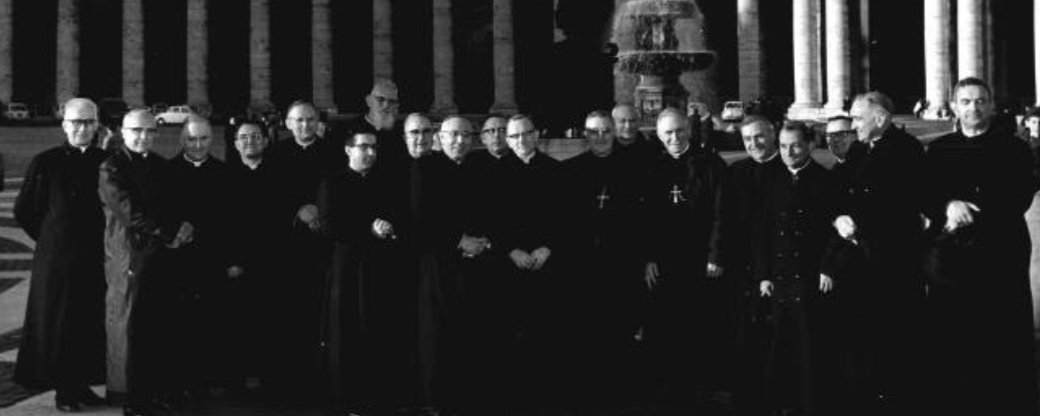
Rod Dreher’s long-awaited book The Benedict Option has been released. A common theme among reviewers is that Dreher is overly dramatic in his critique of contemporary culture. That he is too dark, too pessimistic.
One of the defenders of Dreher’s reading of the signs of the times is Philadelphia Archbishop Charles Chaput. Writing for First Things, Chaput attempts to ward off criticism of Dreher’s book from Calvin College professor James K.A. Smith. Smith in an essay for the Washington Post describes The Benedict Option as “tinged with a bitterness and resentment and sense of loss that carries the whiff of privilege.” Chaput argues that the professor’s column – “The new alarmism: How some Christians are stoking fear rather than hope” – is “an expression of [Smith’s] contempt for discomforting ideas rather than real criticism of the actual content of the books he so truculently dismisses.” The Archbishop takes up his pen to defend the “alarmist” allegation:
The Word of God has a generous collection of alarmisms: “I have set before you life and death, the blessing and the curse”; “repent and believe in the Gospel”; you “brood of vipers”; you “whitened sepulchres”; the parable of the sheep and goats, among many others…
Jesus had the awkward habit of talking about hell—far more often, in fact, than St. Paul ever did…
Irenaeus was an alarmist. Augustine was an alarmist. Basil was an alarmist. John Calvin and the Reformers, both Protestant and Catholic, were alarmists…
Pessimism is the selfish refusal to hope; a surrender to the world as it is; a repudiation of trust in the goodness of God, his love for us, and his desire for our joy, no matter how challenging our circumstances. This pessimism is precisely what the books by Dreher, Esolen, and others (including, I hope, my own) seek to work against. Naming the problems in a culture truthfully, and pointing a way forward for those awake enough to notice, is neither bleak nor negative. It’s called Christian realism, and it’s a virus that’s going around.
If that’s also a “new alarmism,” then we need more of it, not less.
The Archbishop is no doubt correct. To name the problems in the culture truthfully and prescribe a course of action is neither bleak, pessimistic, or negative. Indeed, it is what the Church has done throughout the ages with its issuances of anathemas and denunciations of error. Yet when the princes of the Church gathered together at Vatican II, that time-tested method of defending the faith was jettisoned in favor of a new “pastoral” approach. Paul VI, in his closing speech, said the Council “insisted very much more upon this pleasant side of man, rather than on his unpleasant one. Its attitude was very much and deliberately optimistic.” John XXIII, in his opening address, chastised those “prophets of doom” who were “always forecasting worse disasters, as though the end of the world were at hand.”
Intellectual honesty requires an admission that those “prophets of doom” were not hyperbolic in their concerns. Rather, Bishops like Marcel Lefebvre and Antonio de Castro Mayer accurately predicted what would happen if Tradition was not adhered to. Neither bitter nor paranoid, their desire to hand on what they received coupled with an alertness of sin and the wicked ways of the devil makes them the original “Christian realists,” the original “alarmists” who warned about the coming cultural crisis.
At the Council, they and fellow members of the Coetus Internationalis Patrum, after having surveyed the debauched landscape of the 20th century, pushed for a condemnation of Communism, a re-iteration of the Social Kingship of Christ, a statement on the Blessed Virgin Mary, and a declaration on the need for non-Catholics to return to the true fold of Christ. As Vatican II progressed each of these Holy Spirit-inspired recommendations were shot down, not only by “good Pope John” but by the manipulative Rhine faction, whose truculent dismissals of Traditional proposals reflected their contempt for discomforting ideas rather than real criticism of the actual content of non-progressive arguments. In time, the anti-Traditionalists won out and re-wrote history. To this day the prevailing narrative is that the Church at the Council liberated itself from the insular, gloomy Catholicism of the pre-conciliar era. Nothing could be further from the truth.
In any case, Chaput’s defense of the “new alarmism” is correct. The world is awash in sin and growing ever more hostile towards truth by the day. It is not improper to expose that hostility for what it is. But if he wants to be consistent, His Excellency should admit two things. One, recognize that the logic employed by defenders of the Council means that the new alarmists are the 21st century’s version of the “prophets of doom.” And two, accept that what James K.A. Smith is saying about Dreher and others is the same inaccurate, uncharitable labelling the victors at Vatican II, himself included, used and still use to smear the holy defenders of Tradition.
Listen to Magnificat Radio on iTunes and Sound Cloud
